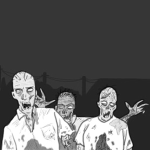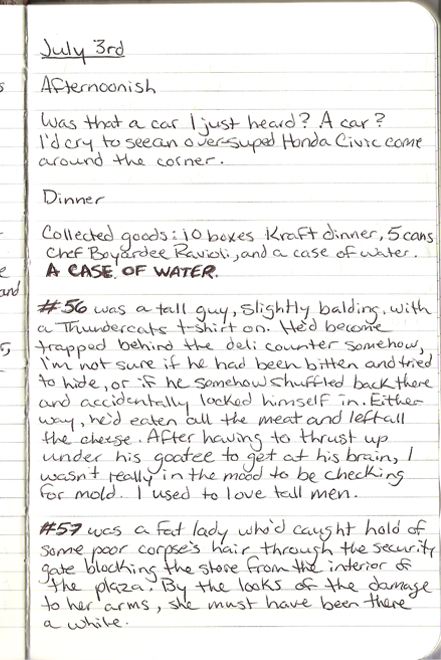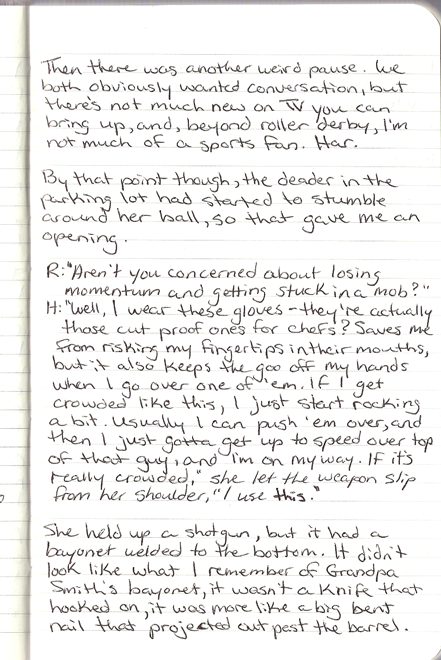 Welcome to Flash Pulp, Episode Fifty-Four.
Welcome to Flash Pulp, Episode Fifty-Four.
Tonight, we present Life & Limb, Part 1 of 1
[audio:http://traffic.libsyn.com/skinner/FlashPulp054.mp3]
Download MP3
(RSS / iTunes)
This evening’s episode is brought to you by tardiness – and we apologize.
Flash Pulp is an experiment in broadcasting fresh pulp stories in the modern age – three to ten minutes of fiction brought to you Monday, Wednesday and Friday evenings.
Tonight we present a rumination on the human, and inhuman, of the future.
Flash Pulp 054 – Life & Limb, Part 1 of 1
Written by J.R.D. Skinner
Art and Narration by Opopanax
and Audio produced by Jessica May
Manny Espinoza was 19, and sweating heavily under his combat gear while watching a goat wander a barren yard. To his eye, the house he was guarding looked like little more than a pile of sun baked mud that had had some rogue lumber laid across it. The poverty of the shanty wore at him, so he instead turned to the surrounding scrub-land, in an effort to ignore it. Depressingly, the alternative only forced him into mental comparisons with the lush forests surrounding his parents’ home in Maine.
A chicken scrambled from a shadow at the corner of the building, heedless of Manny’s weapon pointed in its direction.
The bird was followed by a boy of eight, who glanced nervously at the American, and attempted to shoo the fowl away from the gathered assault rifles and watchful glances. Manny once again put the hard question to himself: would these people be better served if he had instead opted to become a teacher? His mother would have said yes, his father no. As the boy finally hustled the hen away, Manny took comfort in the knowledge that he’d have plenty of time to teach his own child after he’d made it home – and after he and Angela had tired themselves sufficiently in the efforts leading to conception.
He smiled at this bright spot in his imagination.
There was a shout from inside the house, and Manny turned, suddenly aware that this wouldn’t be just another door knock.
* * *
He awoke in Germany, only vaguely aware of the trip, and not at all able to recall the explosion that everyone had insisted on telling him about when he’d occasionally manage to swim out of unconsciousness.
He cried hard at the loss of his legs, but damned the loss of his manhood.
* * *
By the age of 27, Manny had largely put himself back together.
After physiotherapy, he’d found himself behind the front desk at his father’s construction company. At first he’d longed to be on site with the old man, but he soon found he had a knack for working the phones, and, being able to sit all day, most of the folks who came through the office didn’t even realize he’d been injured.
Veteran’s Affairs had also played a large part in his recovery – while there would never be a replacement for his ability to have children, nor for Angela, who had left him before he was even fully weaned from morphine, his carbon-fibre legs allowed him to move with nearly the same agility he’d had before the incident.
The explosion was forever lost to his memory, but he’d read the details: how he’d responded to Lipski’s shouting; how he’d somehow clobbered the two guys who’d been hiding in the house, even as they were tossing a grenade after his hastily departing Sergeant; how his attempt to dive out of the way had left only his lower half shredded by shrapnel.
The medals were nice, but did little to increase his mobility, nor to ease the looks of terror he saw creeping into young children’s eyes at his approach – usually seconds before being scooped up by a soccer mom who would then give him a polite smile of apology while being sure to maintain eye contact.
* * *
Manny, now 32, was on a bench in the small park across from the office, eating his lunch. He’d spent most of October on the oak planks, the chill having given him an excuse to lay a blanket across his lap. The covering meant that the children romping around the play structure took no notice of him, and he could spend his midday meal daydreaming over a variety of sons and daughters he would never have.
This was especially a relief, as he’d spent three hot and painful weeks in August having his simple prosthesis replaced with appendages that whirred like a television robot as he moved, but otherwise allowed him to run twice as fast as he’d ever managed. The development was so new they hadn’t had time to work out proper cosmetics for it, and, even when covered by pants, his limbs had an odd, chicken-leg appearance as he moved. Jumping to the top of the list for the experimental procedure had been the first advantage his medals had ever really brought him, and he’d celebrated the whole affair by spending the majority of September on an extended hiking vacation.
A breeze carrying the scent of late-season barbecue brought him back from memories of the Appalachian trail, and he wiped sandwich crumbs form his lap, still surprised by the coldness of the titanium beneath.
From the corner of his left eye, he noted a red pickup jump the curb.
It had entered from the furthest point of the park, meaning it had to cross over the baseball diamond before reaching the play structure. For a moment, Manny thought it would likely stop, but by the time it had obliterated the chalk line between second and third base, it had plenty of momentum and time was short.
He stood, sprinting towards the slide.
“Get out of the way!” came from his mouth, but the children needed no words. Their parents had long warned them to keep half an eye on the man with skeleton legs who spent long afternoons watching them at play.
One such mother looked at him in surprise, her back to the rapidly closing truck, and Manny pointed past the woman, still running at the structure.
“Ed!” the woman said as she turned. She dove from the Ford’s path.
Manny attempted to stop short of the truck’s trajectory, but there had been little reason to practice stopping suddenly from a full tilt run, and he went over sideways, landing directly in the trucks path.
He didn’t feel the tire roll over his neck.
* * *
It was a coincidence that the letter arrived on his 35th birthday. His Mother had come to the small white room regularly, and she often brought his mail to read to him aloud, as it was tough to maintain proper conversation with a man who could only blink to communicate.
Usually their time was spent rambling through junk fliers, but Manny was still grateful for the effort.
It was hard to understand what the terms of the thick envelope were attempting to imply, but Manny’s mother had wept during its reading, and when the trio of lab technicians arrived a week later, he could do little but blink yes to their barrage of questions and release forms.
Before he’d turned 37, he found himself standing in front of a full length mirror, in a room that seemed half surgery theatre and half mechanic’s shop. He was flexing arms and legs made entirely of lightweight composite materials, materials he was assured would have been capable of shrugging off even the impact of the Ford.
He was impressed by every aspect but his face. His jaw had been torn away in Ed’s third attempt at running down his ex-wife, who’d survived the attack by using the play structure as a shield. The pink triangular flap that acted as the mouth for his digitized voice disturbed him with its jerky clockwork motions.
Two months after his release from the hospital, at the insistence of his mother, he slunk into a mall food court, in his first public appearance since the new surgery. His heavy coat and broad hat allowed him to pass with only the looks afforded any man wearing clothing inappropriate for the season, at least until a five year old had rushed by in an attempt to chase down his slightly older sister. The girl had been careful to give a wide berth, but the boy had seen the shortest path as running alongside Manny’s table, and had taken it.
A flailing arm knocked away the hat, and, after hearing an admonishing name call from his mother, the boy turned to apologize, even as Manny stooped to pick it up.
“It’s OK,” Manny said, not looking at the boy.
He could feel his pseudo-chin sagging as it clicked open and shut.
The boy, suddenly caught up in terror, began to shriek and weep.
As the vet slammed his hand down in frustration, the cheap plywood table cracked. The attention of the gathered having already been drawn by the screaming, the shattering wood sent a panic through the crowd.
An hour later, cautious police led Manny, still leaking tears, from a side entrance.
* * *
At 42, he finally found his calling. It had started eighteen months previous, after he’d had what he called “The Idea” while wasting away another afternoon in his shuttered bungalow, watching cartoons.
A flurry of emails had followed his inspiration, and now, having argued his case and won, he stood in a large change room, his ears filled with the hum of the sea of people outside. The presentation was taking place in a high school gym, but children of every age had been bussed in to assemble cross legged on the hardwood floor.
Pushing open the door, he peeked at the brightly lit platform. Principal Ebert had taken the stage, smoothly entering into the spiel that Manny, and the team who maintained him, had put together.
His final modifications hadn’t added any new functionality – if anything, they’d subtracted, although Manny didn’t count the removal of the nightmare-jaw as any sort of loss. His face was now a smooth chrome surface, broken only by the holes that allowed for vision and a small grate approximating where his mouth would be, and from which his voice projected.
In fact, every visible surface that extended from beneath his crisp white t-shirt and khaki shorts gleamed, even in the low lighting of the sweat smelling room.
Ebert finished, and Manny took his cue, entering the A/V club’s spotlight to a swell of music.
The speakers faded away, and there was a hush.
After they’d subsided, Manny began his practiced speech decrying discrimination, occasionally emphasising his point with a demonstration of inhuman physical prowess.
With the glare in his eyes, it was hard for him to know how well he was being taken, but at least there was applause every time he lifted something heavy.
As he concluded his talk, he stepped down to the left side of the platform, butterflies rising in the remainder of his stomach as he opened himself to being approached by the gathered.
It would be hours before the line of children, all waiting for a photo of themselves resting atop Manny’s tirelessly flexing biceps, would let up.
Flash Pulp is presented by http://skinner.fm. The audio and text formats of Flash Pulp are released under the Canadian Creative Commons Attribution-Noncommercial 2.5 License.
![]() Tonight, we present Mulligan Smith and A Little Luc, Part 3 of 3
Tonight, we present Mulligan Smith and A Little Luc, Part 3 of 3 Welcome to Flash Pulp, Episode Forty-Nine.
Welcome to Flash Pulp, Episode Forty-Nine.





